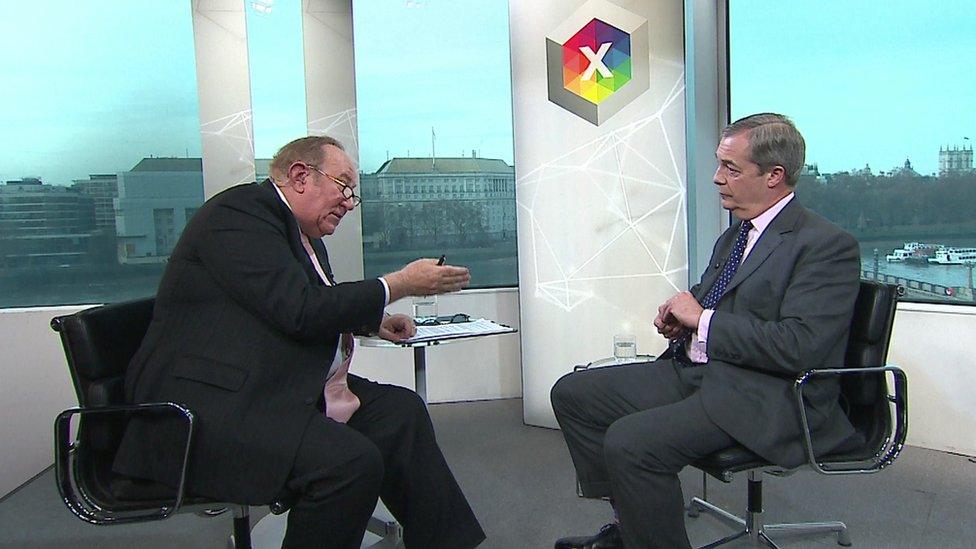General Election 2019: Nigel Farage's interview fact-checked
- Published

The Brexit Party leader Nigel Farage was the fourth party leader to be interviewed by the BBC's Andrew Neil in this election campaign.
They covered a number of topics, including immigration and the NHS, life after Brexit and the impact of his previous party, UKIP. BBC Reality Check looked at four of his claims.
Claim: "There are eight million more people living in this country today than there were when Tony Blair came to power in 1997"
Reality Check: Nigel Farage is correct that the UK population has increased by about 8 million since 1997, to about 66 million, according to the Office for National Statistics, external.
Claim: Immigration has put a "massive burden" on the NHS
Reality Check: Nigel Farage made this claim in response to Andrew Neil's questions about how he'd fill vacancies in the NHS and social care, if there were controls, after Brexit, on EU migrants coming to the UK to work. Mr Farage said, in fact, immigration had put a "massive burden" on the health service.
So, what does the evidence show?
The Migration Advisory Committee, an independent public body that advises the government, looked at this as part of its report into the effects of immigration from the European Economic Area (EEA).
It found that migrants from Europe "contribute much more to the health service and the provision of social care in financial resources and through work than they consume in services."
It said migrants from the EEA tend to be younger and healthier than the UK-born population, and consume fewer NHS services than them.
It found "no evidence that migration has reduced the quality of healthcare."
According to the Health Foundation, external 13.3% of the entire workforce of NHS staff in England, and 28.4% of doctors, are from outside the UK (both EU and non-EU).
Claim: The UK will be tied to EU rules after Brexit
Reality Check: Nigel Farage said: "Just take Article 77 of the political declaration, it says on everything, even taxation, we'd be tied to EU rules." Mr Farage was taking issue here with parts of the Political Declaration, external - it's the document that sits alongside Boris Johnson's Brexit deal.
It sets out a framework for the relationship between the UK and the EU after Brexit but is not legally binding.
Article 77 pledges that the two parties will create a "level playing field", by upholding current standards in "areas of state aid, competition, social and employment standards, environment, climate change, and relevant tax matters".
The intention is to prevent UK companies from out-competing European rivals by adopting weaker standards on areas like employment, or by receiving unfair government subsidies.
While there is no legal obligation to follow the Political Declaration, the EU would be likely to restrict the UK's access to the single market if it tried to drastically undercut European standards.
The 2018 Withdrawal Agreement (known as Theresa May's deal) had an extensive list of binding level playing field provisions, on issues such as taxation and labour standards. These were removed from the revised version (Boris Johnson's deal).
Claim: Did Nigel Farage give David Cameron a majority in 2015?
Reality Check: Nigel Farage said: "We took far more Labour votes in the key seats in the Midlands in that campaign and actually the Conservatives got a majority because of us."
Mr Farage, who led UKIP at the time, has claimed credit for David Cameron's victory in 2015 before.
He argues that former Labour supporters voting for UKIP helped to give the Conservatives victory in marginal seats, especially in the Midlands and the north of England.
It's impossible to know for sure how people would have voted if UKIP hadn't stood but recent research for the authoritative British Election Survey raises some evidence, external that might question this claim.
Their research found that in 2015, UKIP drew about a third of its support from the Conservatives, more than it did from Labour.
The authors conclude that "our evidence shows that UKIP hurt the Conservatives in 2015".
In defence of Mr Farage's claim, the Brexit Party directed us to a 2015 study by Professor Matthew Goodwin of the University of Kent, external, which found that the impact of UKIP in Conservative seats was "far more modest" than in Labour seats.


